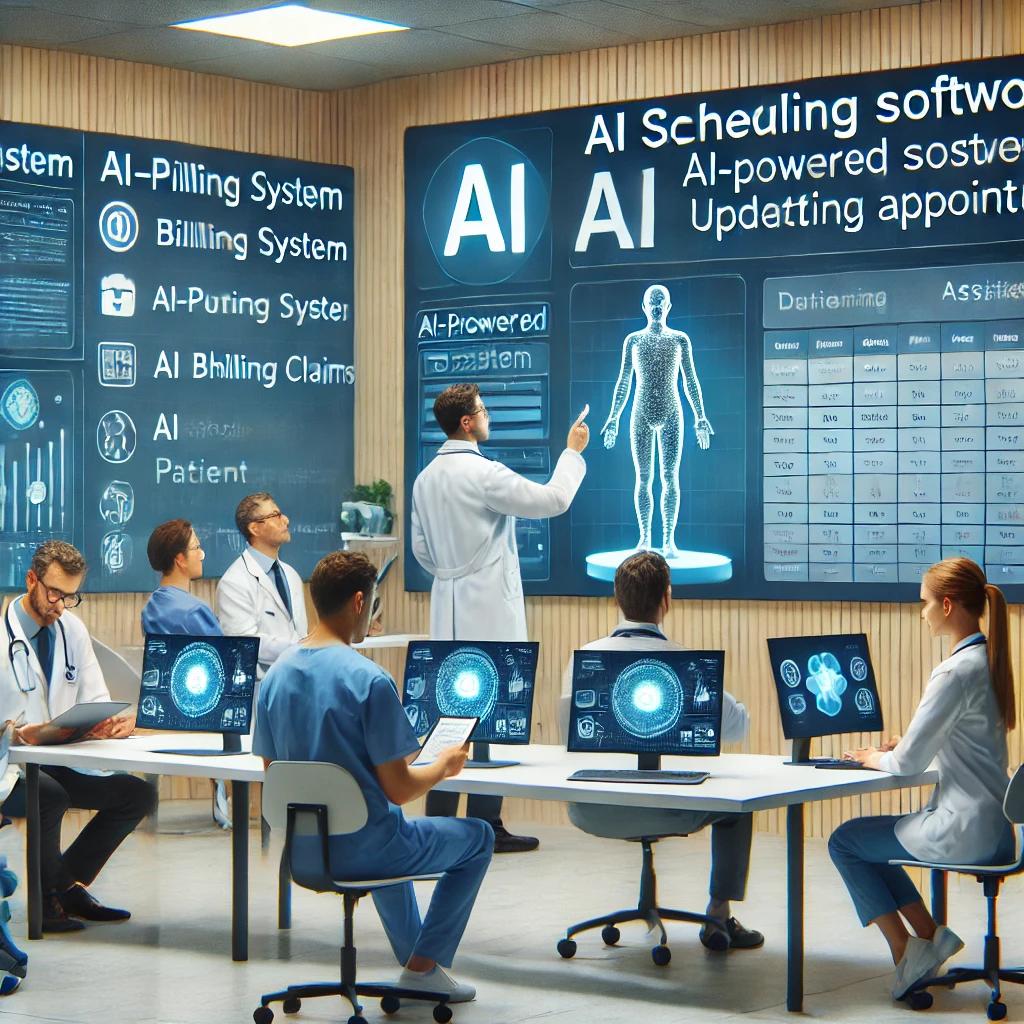
AI in office administration helps streamline scheduling, patient communication, and billing. AI-powered chatbots handle patient inquiries, automated scheduling systems reduce no-shows, and AI-driven billing software prevents errors, ensuring smooth clinic operations.
AI in the Doctor's Office: A Guide to Smart
Healthcare
Chapter 2: AI-Powered Office Administration
2.1 AI for
Scheduling and Appointments
Efficient appointment scheduling is
essential for patient satisfaction and clinic profitability. AI-powered
scheduling systems optimize patient flow, reduce no-shows, and
streamline administrative tasks, ensuring that doctors spend more time
on patient care and less on logistics.
How AI is Revolutionizing
Scheduling
1. AI-Powered Smart Scheduling Systems
AI systems
analyze historical appointment trends, patient preferences, and doctor
availability to create the most efficient schedules.
✅ Example:
Qventus, an AI-powered hospital operations platform, uses predictive
analytics to reduce scheduling conflicts and optimize doctor
availability in real time.
✅ Impact on Doctor's Offices:
Reduces patient wait times by adjusting schedules dynamically.
Minimizes appointment gaps, increasing clinic revenue.
Adapts to
cancellation patterns, automatically filling slots with waitlisted
patients.
2. AI-Driven Automated Appointment Reminders
AI
automatically sends reminders through text, email, or phone calls,
significantly reducing no-show rates.
✅ Example: Zocdoc AI
improves patient attendance rates by 26% through personalized reminders.
✅ Impact on Doctor's Offices:
Reduces missed appointments,
ensuring optimized scheduling.
AI reminders reschedule patients
efficiently, avoiding revenue loss.
AI chatbots assist patients in
canceling and rebooking without human intervention.
✅ Case Study:
Cleveland Clinic implemented an AI-powered scheduling system, reducing
patient wait times by 50% while cutting appointment no-shows by 35%.
3. Real-Time Dynamic Scheduling
AI adjusts appointments in real
time based on delays, cancellations, and emergency cases.
✅
Example: Epic Systems' AI Scheduler updates doctor availability
instantly if a patient cancels last-minute.
✅ Impact on Doctor's
Offices:
Reduces downtime for doctors.
Ensures high-priority
patients get earlier appointments.
2.2 AI Chatbots for Patient
Inquiries
Medical offices receive hundreds of patient inquiries
daily, including appointment requests, prescription refills, and
symptom-related concerns. AI chatbots handle these tasks, freeing up
front-desk staff for urgent matters.
How AI Chatbots Improve
Medical Office Operations
1. 24/7 Virtual Patient Assistance
AI
chatbots answer patient questions, schedule appointments, and provide
basic medical advice.
✅ Example: Mayo Clinic's AI Chatbot handles
basic symptom triage, advising whether a patient needs an urgent
consultation.
✅ Impact on Doctor's Offices:
Reduces phone
call volume, allowing staff to focus on urgent cases.
Provides
instant answers about office hours, locations, and policies.
Saves
time for receptionists, improving workflow efficiency.
2. AI in
Pre-Appointment Triage
Patients often call with vague symptoms. AI
chatbots help prioritize urgent cases by triaging symptoms before they
see a doctor.
✅ Example: Buoy Health, an AI chatbot, asks
patients about their symptoms and provides initial recommendations based
on medical databases.
✅ Impact on Doctor's Offices:
Helps
doctors focus on critical cases by filtering low-risk inquiries.
Improves patient satisfaction with faster responses.
3. AI in
Multilingual Patient Communication
AI chatbots can communicate in
multiple languages, improving accessibility for non-English-speaking
patients.
✅ Example: Google's AI-based medical translator allows
clinics to interact with diverse patient populations.
✅ Impact on
Doctor's Offices:
Enhances patient engagement.
Reduces
miscommunication risks.
2.3 AI for Billing, Coding, and Insurance
Automation
Medical billing is a time-consuming process with a high
risk of errors. AI automates coding, insurance claims, and fraud
detection, saving time and reducing revenue losses.
How AI is
Transforming Medical Billing & Insurance
1. AI-Driven Medical Coding
AI automatically extracts billing codes from doctor's notes, ensuring
accurate claims submission.
✅ Example: Nabla AI converts doctor's
speech into structured billing codes with 95% accuracy, reducing manual
errors.
✅ Impact on Doctor's Offices:
Reduces denied
claims from coding mistakes.
Saves administrative staff hours of
manual work.
2. AI-Powered Claim Processing
Insurance claims often
get delayed or denied due to incorrect documentation. AI pre-checks
claims before submission, ensuring compliance with insurer requirements.
✅ Example: Olive AI processes insurance claims 50% faster, improving
cash flow for medical offices.
✅ Impact on Doctor's Offices:
Reduces claim rejection rates.
Saves staff time on paperwork.
3. AI for Fraud Detection in Billing
AI detects fraudulent claims by
analyzing billing patterns.
✅ Example: MedAware AI flags
suspicious billing activity, preventing fraud-related financial losses.
✅ Impact on Doctor's Offices:
Reduces compliance risks.
Saves money by preventing fraudulent claims.
Review Questions
1.
What is a key benefit of AI-powered scheduling?
A. It increases
patient no-shows
B. It dynamically adjusts appointments in real time
C. It replaces doctors
D. It makes scheduling more difficult
2. How do AI chatbots improve front-desk operations?
A. By reducing
phone call volume and handling routine patient inquiries
B. By
replacing medical assistants entirely
C. By diagnosing complex
medical conditions
D. By forcing patients to self-diagnose
3.
What does AI-powered billing help prevent?
A. Faster appointments
B. Coding errors and fraud
C. More phone calls
D. AI replacing
office managers
4. How does AI reduce claim rejections in medical
billing?
A. By guessing patient symptoms
B. By automatically
checking codes before submission
C. By filing claims manually
D.
By delaying insurance processing
Answer Key:
B (AI dynamically
adjusts appointments to reduce wait times)
A (AI chatbots reduce call
volume and handle routine questions)
B (AI detects coding errors and
fraud in billing)
B (AI pre-checks insurance claims to ensure
compliance)
References & Further Reading
Topol, Eric. Deep
Medicine: How Artificial Intelligence Can Make Healthcare Human Again.
Basic Books, 2019.
Harvard Medical School. AI in Medical
Administration: A Case Study on Scheduling and Billing. 2022.
Mayo
Clinic AI Initiative. How Chatbots Are Enhancing Patient Communication.
2023.
Final Thoughts on Chapter 2
AI in scheduling, chatbots, and
billing automation improves efficiency, patient experience, and
financial accuracy in doctor's offices. These tools reduce workload,
minimize errors, and enhance overall office management, allowing medical
professionals to focus more on patient care.